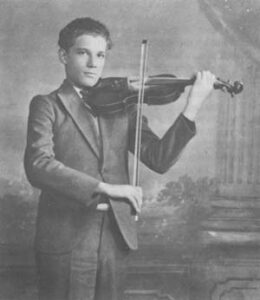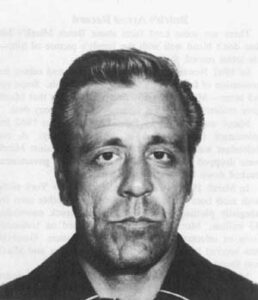I keep asking people why Herb Gross went bad. Maybe his own answer, vanity, is too broad, such a pervasive motivation that it explains everything and nothing.
“He did it for the money,” says Dion Feltri, a plainclothes cop who knows Gross well. Dion’s wrap-around sunglasses fit with his street-smart demeanor. He prefers short answers, not essays.
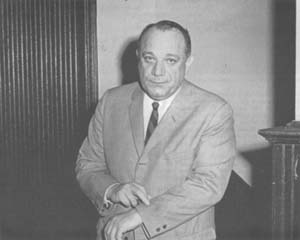
Ed Houston has his own theory: “Herbie liked being around gangsters. He thought they were glamorous. I think he was infatuated with them.” The underworld holds no glamour for Houston. He knows it too well as an insider. He’s a huge black man who came to be trusted by many Italian mobsters, not as an adopted relative, more like a large, friendly dog who could perform useful services. Houston was a bit player in Gross’s story, a participating observer.
Gross doesn’t accept either Houston’s or Feltri’s analysis, but there’s probably some truth in both. Gross always looked for money angles, still does, in fact. Now he dreams of selling his life as a television series, still hoping to become significant. Gross’s years with the mob involved him in some big-money deals, but his share usually was meager. For setting up the $400,000 Fairmount Hotel robbery in New Jersey in 1968, Gross got $2,000. He didn’t complain. Gross says that power meant more to him. But in a way he was investing in the future, graciously accepting slim slices with hopes for bigger paydays ahead.
When I told Gross about Ed Houston’s theory, that hoods were glamorous to him, he became angry: “I despised them. I hated them. I hated to be in their company. I detested them. I thought they were the most ignorant, stupid, but the most cunning, vicious people I ever met in my life. But glamour? No.”
Maybe he protests too much.
The following reconstruction of Gross’s criminal activities draws on many sources: interviews with several participants and observers, court testimony, and hearings held in 1972 by New Jersey’s State Commission of Investigation, where Gross was the main witness in his new role, mob informer. The commission chairman offered his own theory for why Gross had become so entangled with the mob: “Because of the larceny in his heart.”
Gross grew quickly as a political bagman in the 1960s. He found it fascinating. Every dirty deal, every fix, added to his power. Both buyers and sellers became his creatures, accessible for the next deal, vulnerable to pressure if they resisted. The Township of Lakewood needed to hire appraisers for urban renewal. Gross sold the jobs. His fee was small, $100, but he ended up owning his customers. Mobster Vincent Craporatta, known as Jimmy Sinatra, was a silent partner in every illegitimate deal. For half the profits, Sinatra insured against welshers. Gross first used that insurance when Holiday Inn came to Lakewood.
The deal started cleanly in the summer of 1966 with Gross functioning as a real estate salesman. As a sideline, he had picked up a license and was registered to sell for a local broker. A development company was planning to build a Holiday Inn in neighboring Howell Township. The company was headed by a man Gross knew, Al Olshan. Gross convinced Olshan that it would be wiser to build in Lakewood, where sewer and water hookups would be cheaper. Gross earned a $3,000 commission when he sold Olshan a site just inside the Lakewood line. Gross knew he could pick up another commission if he could find a motel operator for Olshan, someone to lease the inn and run it. But that opportunity died when Olshan’s financial backers produced two men who went partners as innkeepers, Carmen Marino and Dick Vogedes.
Then, a snag developed, a haste-makes-waste snag. To speed things along, Olshan’s company had filed their old Howell Township plans in Lakewood. Preliminary approvals were granted before the developer remembered those plans included no bar, only a coffee shop. But Marino and Vogedes couldn’t see a motel without a bar-restaurant. Lakewood ordinances allowed no-fee liquor licenses for 50-unit hotels and motels. Now, because of a filing mistake, it looked like the innkeepers would have to pay $30,000 for a standard liquor license.
A Cheaper Solution
Gross had a cheaper solution. He met with Olshan, Marino, and Vogedes and told them he could still arrange a no-fee license if they gave him $5,000 to spread around. Gross wouldn’t say where the bribes were going. His people wanted protection, he explained. He knew he could keep most of the money for himself. For $500, a township official would allow a one-page change in the motel plans–presto, a bar instead of a coffee shop. For $1,000, a key councilman could guarantee no-fuss approval. Without knowing these details, the motel group accepted the arrangement.
The payoff money was supposed to be delivered the night of the final vote. When no one showed, Gross let the fix go through anyway. He was guessing car trouble or an accident. In fact, his clients were reneging. The innkeepers, Marino and Vogedes, had talked with a state senator. They suspected Gross was conning them. The senator spoke to some Lakewood politicians, including the councilman whose vote Gross was buying. Nothing crooked here, was the flustered reply, it’s all routine, motels get free liquor licenses.
Gross was outraged by the double-cross. “Don’t let them do this to me,” he complained to Olshan. But the developer and the innkeepers were no longer buying. Why pay something for nothing? There could be no fix if no fix was needed.
This redefinition was unacceptable: string-puller no more, instead a phony and a fool. Gross telephoned Sinatra to invoke his welsher insurance and to share the egregious affront with his secret partner: “Hey Jimmy, we’ve been fucked.”
The A & P parking lot in nearby Bricktown was almost empty two days later when Gross drove in for a rendezvous with Sinatra on a Sunday morning. Two parked cars, two men standing alongside, Jimmy and a stranger. Jimmy was wearing his serious face: “This is Johnny D, Herbie. He’s going to give us some help.” The full name is John DiGilio, a former prize fighter who made a bigger name in Bayonne’s rackets. Gross noticed the man’s athletic build, his self-confidence.
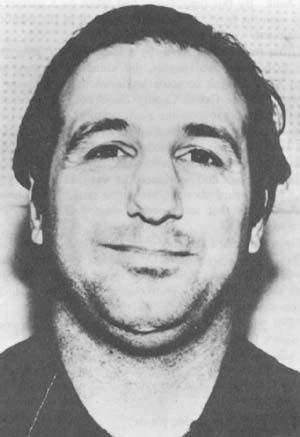
The three got into Johnny’s gold-colored Cadillac. With Gross giving the route, DiGilio drove to Carmen Marino’s home in Manasquan. Three of Marino’s six children were playing on the neat, suburban lawn as DiGilio pulled up. Gross rang the doorbell and lured Marino back to the car for a talk.
The hoods were in the front seat, DiGilio still behind the wheel. As the innkeeper and Gross got in back DiGilio turned to talk over his muscular shoulder: “You owe this man some money and if you know what’s good for you, you’re going to pay him, understand?”
Marino tried to respond. He wanted to say he wasn’t going to be bullied into paying for a phony fix. “Listen, buddy,” he began, but DiGilio interrupted.
“’You don’t call me ‘buddy,’ you mother-fucker. You come up with the money or else. Don’t you know who I am?”
Marino said that he didn’t really care.
“All you have to know is that I’m Johnny D from Bayonne and you better do what I say. Those are your kids out there aren’t they?”
Marino didn’t ask what DiGilio meant, he understood the threat. DiGilio told him to get out of the car and give Gross his money within a week. On the drive back to Bricktown, DiGilio assured Gross his problems were over. Gross was unusually quiet. He was wondering about his allies, telling himself the threat on the children was probably a bluff, but he wasn’t sure.
Gross was called to the phone a few days later at the hotel he ran for his mother, the Hotel Claridge. “Is this Herb Gross?” a male voice asked.
“Yeah–who’s this?” he snapped back, a quick lesson that in his eye-for-an-eye world, the impolite get impoliteness.
“Jones, Smith–what’s the difference. Just listen carefully. This is grace period. If anyone lays a hand on Carmen Marino, you’re a dead man. You get ahold of your people. If they want to straighten this out, tell them to get in touch with Nicky or Hicky.”
Gross wanted details, a number to call.
“If your man is really Johnny D from Bayonne, you just tell him Nicky and Hicky. He’ll know what to do.” Gross’s dispute with the innkeepers would be settled at a sit-down, the mob’s version of binding arbitration.
A week later Sinatra and Gross met Johnny D in the early evening on a back street in Bayonne. They all got in Johnny’s gold Cadillac and drove a short distance to a luxury high-rise. Johnny explained they were picking up someone before driving to New York. He parked and the three men went into the apartment building. They were waiting for an elevator when a young man darted into the lobby and over to DiGilio.
“Johnny, I need some money,” he blurted. “I’m hot.”
“Yeah, I know,” replied DiGilio, pulling out a wad of $100 bills and donating three without care or negotiation. That earned a quick, appreciative “Thanks, Johnny,” as the fugitive hurried back to the streets.
“He’s really hot,” the benefactor confided. “He shot someone yesterday.”
Leaving the elevator, DiGilio led his companions to an apartment and rang the bell. A short, older man wearing a soft fedora mumbled a greeting to Johnny, scanned the others, and waved them in.
“Be with ya in a minute,” he said, walking to a table where he picked up some papers and seemed to be checking figures. Gross pegged him as at least 60, a narrow, lined face behind dark-framed glasses. So maybe he’s Jewish, Gross joked to himself at the hat in the house.
But the apartment wasn’t decorated as a home, more like an office with several adding machines and phones. There were no introductions, but Gross knew from the way Sinatra and DiGilio were acting that the older man was someone important. Years later he would find the face in police mug shots: Bayonne Joe Zicarelli, a New Jersey mob chief.
Zicarelli sat in front with DiGilio on the ride to New York. Johnny D was apprehensive and wondered out loud if the sit-down would be fair: “Maybe this is a setup.”
“Naw, don’t worry,” said Bayonne Joe. “I know the man. We’ll do fine.”
Dingy but vital East 12th Street in lower Manhattan–there are Stations of Life here on the block between First Avenue and Avenue A. Public School 60 for all the encounters of urban childhood. Mary Help of Christians R.C. Church for baptisms, weddings, bingo on Fridays, and funerals. The dead stop first at Adam K. Macagna’s mortuary across the street. A few doors east is the Shore View Social Club, where old men play cards and some deaths may have been arranged. The cops know it’s a mob meeting place; they’ve spotted delegates from separate crime families coming together here.
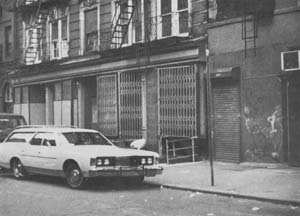
Mostly this block is a place where people live. Flat-faced, seemingly timeless brick tenements line the sidewalk on both sides of the storefront social club. The fire-escapes above are decorative, curved wrought-iron terraces, some with potted gardens, others a place for flying a family’s washday pennants. One brick building looks different; better kept, no fire-escapes. A small sign identifies it as the Salesian Sisters convent. The sisters have the block’s only air conditioners, without resentment: let them not die from the heat, they ask for so little.
The innkeepers arrived early for the sit-down. Marino and Vogedes were businessmen, not mobsters. They had no idea that Gross had a mob connection when they started dealing with him. Even after Johnny D’s threatening visit, they weren’t sure what they were up against.
Maybe this tough-talking character was a phony. But they decided to play it safe and get some mob protection. Vogedes had done some work for a Fort Lee builder named Vincent Ordine and remembered that Ordine had a relative in the rackets. Through Ordine, Vogedes arranged for two gangsters to plead the innkeepers’ case at the sit-down: Anthony DiLorenzo, known as Hicky, and his associate, Nicholas Frustaci, sometimes called Nicky the Blond.
It was getting dark when Marino and Vogedes got to the social club. Between two large plate-glass windows, double doors were open on this warm, August evening. As the innkeepers walked up, a sandy-haired man emerged. He was dressed casually, slacks and a sportshirt.
“You the guys from the Holiday Inn?” he asked. He identified himself as Nicky and then got Marino and Vogedes to tell him their story, why they felt entitled to keep their $5,000. Soon they were joined by his partner, Hicky, whose business suit made him seem more serious about the affair. Lights were on inside the club, and on one side, card players were intent on their game. Through the other window could be seen an empty table, apparently reserved for the sit-down. At the back, there was an espresso machine in the middle of the room, where the players occasionally refilled their little cups.
Shortly before 9 p.m., Gross’s team arrived. Bayonne Joe Zicarelli left his companions to chat quietly with Nicky and Hicky. Gross nodded stiffly to the innkeepers. While they all were waiting, Hicky, the more serious hood, kept staring at Gross, who interpreted the glare as attempted intimidation.
The Consigliari
Then, the evening’s judge came walking slowly down the sidewalk, dignified looking, but overdressed for such warm weather in a heavy dark suit. His fedora looked much like Bayonne Joe’s, but the brim was snapped up, not down like Joe’s in gangster-movie style. The judge was Peter Crocciata, then in his 70s, known to police as a consigliari or elder statesman in the Bonano crime family. As Crocciata approached, Nicky, Hicky, and Bayonne Joe moved quickly toward him. Each embraced him and kissed him on the cheek. Their haste made it seem as if more points would go to the hood who hugged him first.
Judge and greeters went into the club, leaving the others outside. Marino and Vogedes stood by themselves, away from Gross and his allies, DiGilio and Sinatra. They all could see the sit-down through the window, but they couldn’t hear what was being said.
Gross quietly asked Sinatra why the principals weren’t inside–didn’t the judge want to get the story from the horse’s mouth?
“Only Sicilians sit at the table,” Sinatra replied. “That’s how it’s done.”
A few times, Nicky came out to get information from Marino and Vogedes. Twice, Bayonne Joe came out. He put his questions to DiGilio, who went to Gross and Sinatra for answers. Zicarelli apparently didn’t mind the delays, preferring to limit his contacts, like a captain who deals only with the first sergeant.
The Decision
The sit-down lasted almost half an hour. Bayonne Joe was first out the door. Walking over to DiGilio, Sinatra, and Gross, he said: “We got the decision.” He proposed a gesture of respect to Nicky and Hicky, some reduction in the $5,000 demand. Sinatra and Gross looked at each other and decided to settle for half, $2,500. Crocciatta smiled a benediction when Zicarelli gave him the figure. The consigliari informed Nicky and Hicky, and then after collecting embraces from the three advocates, he walked off into the night.
On the drive back to New Jersey, Bayonne Joe said one of the innkeepers would deliver the $2,500 to Gross in cash at his hotel at 8: 00 a.m. the next day.
“Suppose he doesn’t show up?” Gross asked.
“He dies,” Zicarelli said calmly.
After dropping off Zicarelli, DiGilio drove Sinatra and Gross to their car. Pleased by the night’s work, DiGilio told Sinatra: “You really got a good thing here. Now these guys belong to you forever.”
The prediction was accurate. Lakewood’s Holiday Inn became a feeding ground for Gross and Sinatra. Gross picked up $5,000 by tricking a man named Rusty Moccia who was eager to operate the motel’s restaurant. The innkeepers aided Gross in convincing Moccia that he couldn’t get this money-making opportunity without first buying out Gross’s option to run the restaurant, an entirely fictional agreement. Moccia soon was short of capital. He borrowed at shylock rates from Sinatra, but couldn’t catch up and went bankrupt within six months.
Gross and Sinatra made money from almost all of the motel’s purchases. They got a percentage from the jukebox, the vending machines, even the meat supplier.
As it turned out, the sit-down was much more than an arbitration hearing to settle a dispute. Rather, it was a double wedding, with both sides, Gross and the innkeepers, marrying the mob. The innkeepers were obligated because they had sought mob justice and accepted the tribunal’s authority. And Gross’s understanding with Sinatra was no longer theoretical, an unused insurance policy. By collecting on his insurance, Gross, too, became forever owned. He didn’t notice it. But he saw some other changes.
“For one thing, for the first time, Al Olshan (the motel developer) talks to me with obvious fear in his manner and in his eyes. He has come to a decision that he can not con me or bullshit me, and that if he’s going to deal with me, he’s got to be right above board, on the table with what he says. He talks to me differently. I’m no longer a flunkie.”
Power for Gross, power based on fear. He accepted it, he enjoyed it. He rationalized that no one really would murder a man for $2,500. But he couldn’t be sure.
Carmen Marino arrived on time with the cash. He walked into the Hotel Claridge lobby, which was brightened by new red carpeting and a striking needle-point parrot created by Gross’s mother. Gross was standing behind the main desk, and Marino handed him an envelope. Gross opened it and counted the money.
“Right?” asked Marino.
“Right,” said Gross. Marino turned to leave.
“Hold on.” Gross reached under the counter for some Hotel Claridge stationery and wrote: “Received from Carmen Marino the sum of $2,500, for services rendered,” and signed his name.
Later, Sinatra came to collect. “First give me half for Johnny D,” he said, explaining that they had to pay for Johnny’s efforts. Gross counted out $1,250.
For himself, Sinatra took half the remainder, $625.
“Jimmy, that only leaves me $625. What about the guys who are waiting for their payoffs?”
“Fuck ’em,” Sinatra replied.
Six months after the sit-down, Sinatra sold Gross part of his illegal numbers operation. Thirteen runners were working Ocean County for Sinatra, collecting about $6,000 a week in small bets, little wishes for a lucky number. Sinatra had a sudden cash crisis when an unlucky number came up for him and he needed $6,500 to pay winners. He walked into the Claridge and offered Gross two-thirds ownership for $6,500, plus another $1,000 to reestablish the bank. By this time, Gross had taken on a partner to help with the hotel who agreed to go half in the numbers investment.
Gross found numbers to be a lousy racket. Everyone had to be paid: the runners, the winners, the cops, and even $ 100 a week to some unknown mob superiors in Newark for the Ocean County franchise. When Sinatra went away on vacation the next summer, outsiders tried to muscle in. One of Gross’s men was picking up bets at the Hotel Allaben, operated by Ed Houston in Lakewood’s growing black section. A stranger approached Gross’s collector and announced he was taking over. Soon after Gross heard about it, his phone rang. Houston was calling to say that some people wanted Gross to come over and talk.
Gross described the encounter years later in testimony before New Jersey’s State Commission of Investigation. Gross said he went into a back room, where some men were sitting at a table. He recognized only two of them, an ex-cop turned crook and Houston.
“Did you have a conversation with them?” the commission’s lawyer asked.
“No, because, as I say, I walked in, recognized these two, and with that Ed Houston said, ‘Meet Nick Verdi,’ pointed to one of them and that was my first meeting with Nick Verdi.”’
Q: Will you spell that please?
A: V-e-r-d-i.
Q: What was your conversation with Nick Verdi, sir?
A: I didn’t get in much comment. He did most of the talking.
Q: What did he say?
A: Quote?
Q: As best you can, sir?
A: “You Jew bastard, you turn over that work. I’ve been sent down here. You have no business having this. Sinatra is out of it and turn over the work.” I tried to protest that Sinatra was part of it, that we had been brought in, he’s in Florida on vacation, when he returns he’ll straighten it out. He didn’t want to hear anything. He’d been sent down by Angelo Sica.
Q: Angelo Sica?
A: Right.
Q: What was your response?
A: Well, he threatened. I refused to accede to his demands and he threatened bodily harm, whereupon I said, “Well, now, let me make one phone call. He’ll verify what I say is true, although he’s not involved in the numbers.” And he said, “Who’s that?” And I said, “Johnny D from Bayonne,” And he says, “Well, you better not be dropping any names. Go ahead and make a call.” So I placed a call from the Hotel Allaben to Bayonne and I got Johnny D, and I acquainted him with the situation, and he said, “Put this guy on.” I only heard Verdi’s side of the conversation. Later, perhaps weeks later, when I met Johnny on some occasion, he told me what his part of the conversation was. From Verdi’s reaction, he became very servile.
Q: Servile?
A: Right.
Q: What do you mean by that, sir?
A: He cringed.
Q: Well, could you hear what he said?
A: Oh yes.
Q: What did he say?
A: “Oh, I didn’t believe him…Yeah, Johnny…Oh, I’d like to meet you. I heard a lot about you.” And, “Oh, no, nobody’s going to harm him…Yeah. Okay, we’ll straighten it out between us. Don’t worry. I won’t touch him,” words to that effect. You know, disjointed, short, snappy. As I said, he cowered, visibly.
Q: He was afraid of him?
A: I think so. When he hung up, he said, “Well, maybe we can get together on this.”
Gross was changing–he seemed to catch the disease of crudeness from his hood associates, Things once prized, such as home and family, now mattered less. He began dating Shirley, married but available, a redhead who enjoyed dressing up and going out. Like the rest of the boys, Gross had a decorative companion who didn’t talk back. His life was becoming an immorality play, a twisted update of 15th Century drama with characters that personify virtue: John Everyman, Charles Noble. Herbert Gross was becoming Herbie the Gross.
©1983 Bruce Locklin
Bruce Locklin, a reporter on leave from the Bergen Record, is investigating aspects of organized crime.

